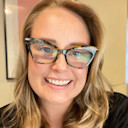How to become a better cook
Have you always dreamt of having the skills to whip up a beautiful and delicious meal worthy of a reality cooking show? It’s never too late to learn new cooking techniques and become a better cook.
At nib, we consider ourselves your health partner, working with the experts to give you the tips and tricks to live your healthiest life yet.
So, to help you take your cooking skills to the next level, we spoke with nib Clinical Advisor Madeleine Buckland to ask her to share her top tips.
Try new cooking techniques
8The idea of upskilling your cooking techniques might seem daunting but Madeleine says delicious and healthy food doesn’t need to be complicated.
“Keep it simple!” she says. “If you want to eat more vegetables but you’re unsure how to cook them, why not start with a salad with lots of flavour?"
She recommends white fish baked in the oven and served with a fresh Greek salad.
“I start by pan-frying the fish skin side down in some ghee until the skin is crispy. Then I squeeze over some lemon and put the whole pan in the oven for 10 minutes until the fish is cooked. I serve it with a Greek salad with cucumbers, tomatoes, olives, red onion, chopped parsley, and a drizzle of olive oil and squeeze of lemon as a dressing.
“The best way to get better at cooking is to have a go and make mistakes,” she adds. “I’ve made some terrible meals on my journey to become a better cook, but I learnt the most from those mistakes. Don’t be afraid to try something new – you have to start somewhere!”
Get familiar with your tools
Whether you want to learn knife skills worthy of an iron chef or how to make perfect thin crepes without burning them, getting familiar with your kitchen tools and practising will help you get there.
“I don’t think there’s any one way to learn how to use a kitchen tool,” says Madeleine. “I learnt to cook by watching my mum and lots of videos on YouTube.”
Madeleine’s three favourite cooking tools are:
Cast iron pot: “It was my mother’s before I had it and it’s so sturdy and reliable,” she says. “I cook everything in it from Bolognese sauce and curries to stews and even bread! It’s my number one kitchen item.”
Wooden spoon: “My kitchen wouldn’t be complete without a wooden spoon,” says Madeleine. “I use it every morning to make porridge.”
Stainless-steel pan: “I used to only cook on a non-stick pan, but since I started using the stainless-steel pan, I’ll never go back,” she says. “I think food tastes better when cooked in it.”
Learn new skills
Madeleine’s top tip for learning new skills in the kitchen is to start cooking food you enjoy.
“Think about flavours you enjoy and try to mimic them in your cooking at home,” she explains.
“For example, if you love butter chicken curry from your local Indian takeaway, have a go at creating it. Curries are a great place to start when cooking delicious and healthy meals because you can add or change ingredients depending on your dietary requirements.”
Test new recipes
“A great resource for simple and healthy recipes is Taste,” says Madeleine. “They have thousands of recipes that are easy to follow. I also love Half Baked Harvest. Tieghan has amazing and delicious recipes for every occasion.”
She recommends this Bill Granger butter chicken curry.
“This meal is a great source of protein from the Greek yoghurt (you can substitute with low-fat yoghurt too), chicken stock and chicken thighs,” says Madeleine. “Chicken thighs offer good-quality animal fat that’s full of fat-soluble vitamins like A, D, E and K. Cashews are also a good source of omega-3 fats.
“If you want to make this vegan or vegetarian, use tofu instead of chicken and coconut yoghurt or coconut milk instead of yoghurt.”
Please note: The tips throughout this article serve as broad information and should not replace any advice you have been given by your medical practitioner.
